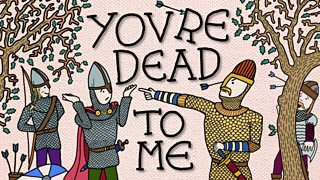Elizabeth I – a pioneering genius, or murderous evil monarch?
She’s one of the most famous monarchs in history, her story so fascinating that it’s been told in many films and TV series, but should we celebrate or revile Elizabeth I? In Evil Genius with Russell Kane, Russell is joined by comedians Esther Manito, Robin Morgan and Sarah Mills to sift through her majesty’s whole life, separating the good from the bad to attempt to make their ultimate verdict – was she evil, or genius? Here are the arguments for and against.
For: She was a pioneering feminist
Elizabeth came to the throne in a time when women had very little power. Royal women were disposable. Her own father, Henry VIII, had her mother, Anne Boleyn, executed. Had Elizabeth married, her husband would likely have claimed her power for his own, so she never married. “In an era that saw women as weak, inferior and unfit to rule, she overturned convention and defied prejudice, resisting all pressure to marry and risk losing power to a man,” says Russell. She remained ‘The Virgin Queen’. “She ingeniously repackaged virginity as a status symbol of female power.” If you never give anyone your hand in marriage, you never give them a chance to nick your throne.
She ingeniously repackaged virginity as a status symbol of female power.
For: She played the political game like a pro
Elizabeth’s refusal to marry was not just to avoid giving away her power in England. It was also a way to help her hold power over other countries. “It craftily kept plates spinning,” says Russell. She kept potential suitors around the world, including in France and Spain, thinking she might marry them and tie their countries together, which gave her the upper hand in Europe. “That was genius,” says Russell. Her methods led to the most stable time in modern English history, if not some romantically miffed noblemen.

Against: She killed those who questioned her
Elizabeth was not always a great leader. During battle with the Spanish Armada, she promised to reward her soldiers for their loyalty. She did not keep that promise. When a group of soldiers came to London to request the payment they were promised, she instead had them killed. Add to that, conditions on board her ships were so terrible that thousands of soldiers died in a resulting typhus outbreak than died in the battle itself. Says Russell, “Not only did she underpay her soldiers, she didn’t take care of them, so more ended up dying from lack of care…than in the battle itself.”
An awful lot of people died because they annoyed her.
Against: She had people tortured for their religion
When it came to religion, Elizabeth, a protestant, severely punished those with different beliefs. “We know she burned Catholics at the stake,” says Russell, “but she also oppressed Puritans, so people that have the same religion as her but a more extreme version. It wasn’t good enough to be a Protestant. If you weren’t the right type of Protestant your organs were getting burnt in front of you.” In an attempt to eliminate the Catholic threat to her throne, Elizabeth ordered the torture and/or death of any Catholics opposing her right to rule, including priests, with the same penalty to anybody who helped them. An awful lot of people died because they annoyed her.
Against: She was tyrannical to Ireland
Though she was queen of Ireland as well as England, the Irish people were largely hostile to Elizabeth. Her policy was to use violence to try to force their loyalty. Russell notes one instance of the despicable way she treated the Irish: she installed Humphrey Gilbert as Governor of Ulster, a man whose strategy was “to decapitate entire villages”. The decapitated heads of innocent villagers were used to line the path to Gilbert’s tent, for unclear reasons. Even other countries were appalled by the extent of Elizabeth’s vicious treatment of the Irish, with the French ambassador at the time noting “the Queen herself would wish Ireland drowned in the sea”.

Three things you might not know about Queen Victoria
Russell Kane's Alternative Obituaries: Queen Victoria
Inconclusive: She had her cousin killed
Having your cousin killed seems clearly bad, but hear the panel out. Mary Queen of Scots long disputed her cousin Elizabeth’s right to the throne and was therefore kept under house arrest in Scotland for two decades, until Elizabeth ordered her execution when she discovered she’d been plotting against her. “Although it is definitely evil to execute a cousin,” says Russell, “she was being plotted against.” Panellist Sarah Mills adds, “It was kill or be killed.” They also make the argument that Elizabeth kept her cousin alive for so long because sending the message that it’s ok to kill monarchs might not be great news for Elizabeth herself.
Elizabeth’s murderous ways were not especially surprising given her childhood
Against: She left her realm in chaos
Elizabeth is regarded as one of the greatest monarchs in history, but she wasn’t exactly one for forward planning. Famously, Elizabeth refused to name her successor. With no children of her own it was her job to make sure the country knew who would take over. Not doing so put the country in a right mess. “She had a responsibility as the monarch to not leave the country in disarray,” says Sarah. While the panel don’t believe she should have been pressured to have a child purely to provide a successor, Sarah says there are “plenty of other options”. Her preferred option? A Willy Wonka-esque contest to find the most awful child and gift them the throne.
For: She was a product of her upbringing
As panellist Esther Manito says, being a royal in the 1500s “you’re either killing people or waiting to be killed.” She says that Elizabeth’s murderous ways were not especially surprising given her childhood. Her mum was accused by her dad of adultery and incest, then beheaded. Her dad then married four more women in the next eight years. She was nearly executed twice herself, by her own sister. Hers was not a stable home. “If you’re growing up in an environment where it’s kill or be killed, you’re going to be in survival mode all the time…I think she’s got post-traumatic stress.”




